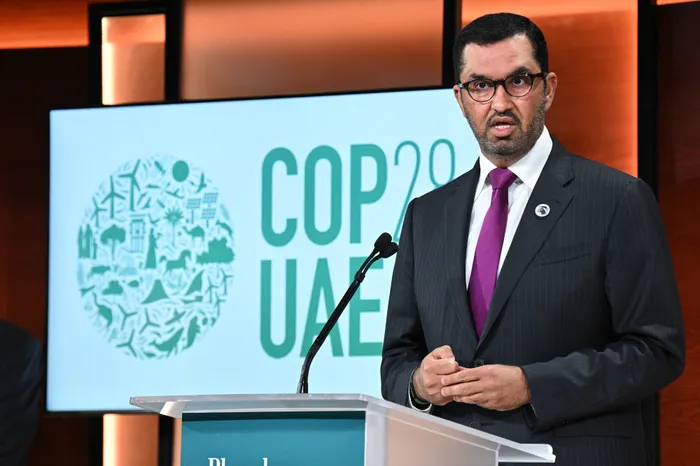Summit is opportunity to fight for credible climate goals

Picture: Bryan Bedder / Getty Images North America / AFP / Taken on October – The president of the COP 28 climate change Sultan Ahmed al-Jaber is “cautiously optimistic” about the success of the UN climate conference. It is “the most important COP” since the Paris Agreement, he said in an interview with AFP on November 25, 2023, should bring “good news to a world” threatened by the climate crisis and the repercussions of the Israel-Hamas conflict.
By Shanice Firmin
At the climate summit COP 28, which is in its final week in Dubai, representatives of the UN member states come together at this annual summit to negotiate and make decisions on climate goals.
At first, it appears to be a well-intentioned international meeting with an important common goal. But looking deeper, you see the conference’s credibility barely existing. Among the superficial, we see conflicts of interest, deep-rooted inequality, and glaring neo-colonial power struggles.
People and communities all over the world are experiencing the horrific conditions of multiple crises on top of long-standing injustices, inequalities and oppression.
The climate crisis is causing extreme weather events and disrupting ecosystems. Those suffering impoverishment, discrimination and exploitation are the most vulnerable to this crisis and have the least access to necessary resources to deal with its impacts.
The climate crisis also exacerbates other crises, furthering impoverishment and deepening inequalities.
Millions of people have lost lives, homes, jobs and livelihoods. Billions face food and water scarcity, health risks, and unrelenting climate-induced loss and damage.
COP 28 provides a critical opportunity to escalate our fight for climate justice and system change and raise long-standing demands for real solutions.
In this concluding week of the climate summit, we will mount a counter-offensive to expose the failures and manoeuvres of governments, corporations and elites to evade their responsibilities and obligations and compel them to advance towards tangible solutions and system change.
The COP 28 summit has failed the people and the planet with more than 2,400 fossil fuel lobbyists in attendance, with negotiations overseen by COP president Sultan Al Jaber, the head of an oil company which declared that there is “no science” demanding fossil fuel phase-out this week.
We are dissatisfied with the slow advancement toward accepting advanced and more relevant decisions for Africa.
Recapping the discussions on adaptation, which are paramount and fundamental to building Africa and the world’s resilience to climate change, is not making headway.
Executing robust adaptation measures remains at the core of addressing current and historical climate injustice, and this must be supplemented with adequate means of operation, to be precise, climate finance.
Africa demands instantaneous and significant action to address the continent’s inadequate adaptation measures and recognise historical injustices.
We demand that the Parties to the UN Framework Convention on Climate Change put tighter measures that secure a continued obligation to fund loss and damage beyond the benevolent actions seen at the opening of COP 28.
The procedure of putting in place conventions and measures required to make the loss and damage fund purposeful must be accelerated. Four years is an extended waiting period for front-line societies fighting with challenges originating from disastrous calamities stemming from climate change.
African civil society is looking forward to seeing loss and damage funding enacted from COP 28.
We need a Just Transition more than ever before – away from fossil fuels to low carbon and fairer economies. We’ve been fighting for this Just Transition at COP.
However, rich countries in the Global North are intent on business as usual. Therefore, mobilising on the ground remains critical where we are able to empower the masses with knowledge, where we focus on small issues and then we are able to build onto the bigger issues. Small issues are important and they inform the big movements.
We note that sitting around the table with fossil fuel lobbyists will not deliver the real solutions needed by the front-line communities.
What do we want?
A Just Transition means cleaner energy, human rights, justice, and dignity for all. We must fix our global tax, trade and debt systems, which
lock poorer countries into loans, continue the extraction of natural resources, and the exploitation of people – all for the benefit of wealthy corporations. We need to build from below, build resistance and strengthen resilience.
To win the fight for climate justice, we must build a broad, grass-roots movement with allies and friends from all over the world – from trade unions to indigenous communities, from land defenders to climate campaigners – to ensure the voices of ordinary people are heard in the halls of COP 28.
Shanice Firmin is Senior project officer for Development, Infrastructure and Climate Change at the South Durban Community Environmental Alliance
Related Topics: